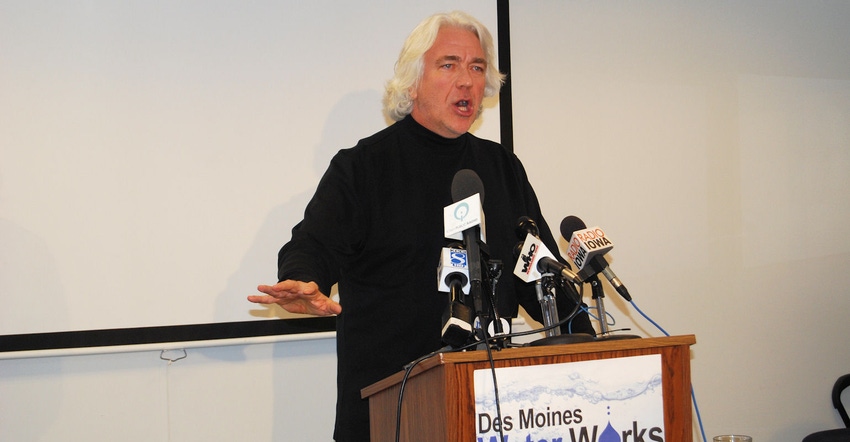March 19, 2017

A federal judge has dismissed the lawsuit brought by Des Moines Water Works against drainage districts in three northwest Iowa counties. The suit, which drew national attention, was filed by the utility in 2015 claiming tile drainage systems in farm fields are responsible for funneling high levels of nitrates into the Raccoon River, a source of drinking water for 500,000 central Iowa residents.
Federal Judge Leonard Strand on March 17 dismissed all claims against the drainage districts in Sac, Buena Vista and Calhoun counties, determining that Iowa’s water quality problems are an issue for the state legislature to resolve, not the court system.
“We’re respectful of the judge’s ruling, but we’re very disappointed,” says Bill Stowe, CEO of Des Moines Water Works. “We are disappointed in the court’s unwillingness to recognize the profound water quality impacts that pollution from drainage districts has on Iowa waterways.”
Water Works reviewing options
The Des Moines utility sought to have drainage districts, and indirectly farmers, regulated under the federal Clean Water Act as a “point source” of pollution, similar to businesses and manufacturing plants. “Since the ruling concludes that Des Moines Water Works could not bring this lawsuit, the ruling does not address whether agricultural drainage tile is a point source as defined by the Clean Water Act,” notes Stowe. He says the Water Works board will now review its options.
Attorneys representing the drainage districts in Sac, Buena Vista and Calhoun counties—defendants in the lawsuit—sought to have the case dismissed. The Iowa Supreme Court had ruled in January the Water Works could not collect damages from the drainage districts to reimburse the utility for the cost of cleaning excess nitrates from the water. But it left the lawsuit intact, to be decided later.
The utility said last year it needs to spend about $80 million to upgrade its nitrate removal equipment so it can continue to meet federal drinking water standards. The Water Works spent $1.5 million in 2015 to run its nitrate removal facility a record number of days to ensure safe drinking water.
Favorable ruling for farmers
Bill Northey, Iowa agriculture secretary, says the ruling to dismiss the suit is good news for farmers statewide who were unsure how the lawsuit might affect their farming operations. He says the costly lawsuit has diverted attention from conservation practices such as cover crops, buffer strips and terraces farmers need more of, to reduce nitrogen and phosphorus losses from fields.
“This court case took a lot of dollars and focus away from what farmers and landowners could do in the field,” says Northey, a Spirit Lake farmer. “They were concerned about what the lawsuit would mean for them legally and financially.”
Stowe says the ruling makes it clear “the Iowa Nutrient Reduction Strategy is now the full path forward” to clean water and public health. He still remains critical of the strategy, adopted in 2013 to cut by 45% the nitrogen and phosphorus levels leaving the state and contributing to the dead zone in the waters of the Gulf of Mexico. That area in the Gulf, about the size of Connecticut, is unable to support aquatic life each summer.
Critics say the Nutrient Reduction Strategy lacks a deadline for achieving its goals, and lacks significant funding to reduce nutrient losses. More cost-share money is needed as an incentive to achieve widespread use of practices such as cover crops, buffer strips, wetlands and edge-of-field practices like bioreactors and saturated buffers on the land. The strategy relies on voluntary compliance by farmers, and critics want to see it made mandatory that farmers use certain water quality protection practices.
Collaboration is needed
Northey says Iowa farmers and cities are working together on projects across the state to improve water quality. The Iowa Department of Agriculture & Land Stewardship announced 12 urban-rural, new water projects last week that will join work in 22 watersheds. �“There’s a lot of work that’s quietly been done and more is continuing that might get more attention now that the Des Moines Water Works lawsuit isn’t sucking up all the attention,” says Northey.
Northey is hopeful Iowa lawmakers will push forward with one of several proposals currently in the state legislature to boost funding for water quality cost-share and related projects. Environmental and ag groups have pushed for the state to raise the sales tax three-eighths of 1 cent and dedicate that money to improving Iowa’s natural resources, including water quality.
Iowa farm organization leaders are also applauding the federal judge’s dismissal of the Des Moines Water Works’ lawsuit against the drainage districts in the three northwest Iowa counties.
“As farmers, we want the safest, best quality water for Iowa,” says Iowa Corn Growers Association president Kurt Hora. “We believe a positive, collaborative approach is the key to improving water quality. Through our work with the Iowa Agriculture Water Alliance, the Soil Health Partnership and our many other partnerships, activities and programs, we are helping accelerate the adoption of practices outlined in the Nutrient Reduction Strategy.”
Iowa Gov. Terry Branstad says, “I’m pleased to see an end to this costly litigation brought by the Des Moines Water Works. From the very beginning, we’ve attempted to work in a collaborative way with our partners in the field and our communities to improve water quality in Iowa. That’s the Iowa way. Now we can finally put this lawsuit distraction behind us and focus on the full implementation of the nutrient reduction strategy.”
For more information visit www.cleanwateriowa.org.
About the Author(s)
You May Also Like






